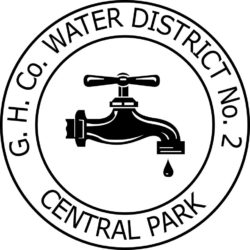When the district first started accepting utility payments by credit/debit card it was celebrated. Now we are experiencing some negative reactions regarding the 2.5% transaction fee collected by the credit card processing company.
Let's start by talking about credit cards and how they work. Credit cards are a tremendous convenience to customers. There is no need to carry around cash for every day purchases, and paying for major purchases is just as easy as buying groceries. You can even pay some bills over the phone. With the advent of online access to credit card statements, you can track your expenditures more easily than with cash or checks.
They also are of benefit to businesses. The big one for business is that payment is far more assured than with checks or with company offered credit accounts. Almost as big is the fact that people tend to spend more money if they are paying with a card.
Credit card companies, credit card processing companies, and banks make a good deal of money off of credit card transactions. So who pays for those transactions?
Well, you and I do. Many businesses simply roll the cost of credit card transactions into the price of their goods and services. It is a good deal based on the benefits to the businesses.
Some other companies charge the customer. For instance, many service stations have two prices for gas, one for cash, the other for credit. The spread (typically about $0.10 per gallon) is the transaction fee.
Either way, the customer pays. It has to be that way. The only source of money businesses have is their customers and every single credit card transaction triggers a fee. So the customers are paying the fee whether they are informed of the fee or not.
Now let's talk about a water district, which is a government entity. Getting paid is less of a concern for a water district than it is for a private business. Customers must pay or not get water service. Fail to pay or pass a bad check and the water gets shut off until payment is received.
Water districts don't experience higher sales by credit card users. The district has it's base rate that everyone pays, and each customer is going to use what quantity of water they want.
So offering credit/debit card payments is strictly a convenience to the customers. There is no benefit to the water district. In fact, there is an added labor burden in tracking and reconciling the movement of funds to and from the credit card processing company, as well as managing the credit card transaction itself.
And there is a three to five day delay before the money arrives in the district's bank account.
The most convenient payment method from the water district's perspective is by check. Cash is a bit more complicated than checks, but the district is required to accept cash.
Water districts don't have a profit margin within which to balance costs. So there is no place to bury the transaction fee. The only way to remove the transparency of that fee is to tack it on to everyone's water bill. This water district is firmly of the opinion that there is already too much upward pressure on water rates. Besides, why should everyone pay for something a very small percentage of the customers use?
There is an added difficulty. The transaction fee is not collected by the water district. That fee is added to the transaction by the credit card processing company. It never appears on the district's books or in the bank account.
The district could remove the transparency by including the cost of credit card transactions in the base rate (State law requires that, with some miner exceptions, we charge every class of customer the same rate) and have the fee subtracted from the total transaction by the processing company. Then everyone would pay the fee and no one would know it.
This is a lengthy discussion, but I hope it goes some way in convincing some people that the district is not lining its pockets at the expense of those who use credit cards.
If you use a credit card, for anything anywhere, you are paying a transaction fee. The difference is that, when you pay your water bill with a card, you know you are paying that transaction fee.
